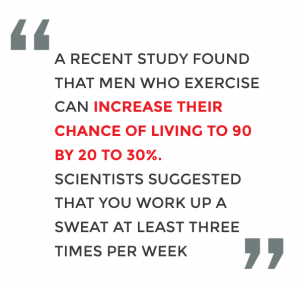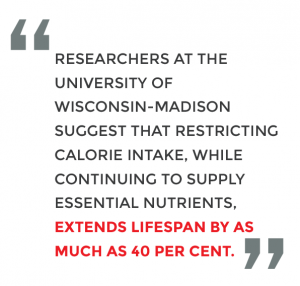If you have been reaching for an anti-aging cream every night yet still feeling older, then perhaps its time to start practicing the right habits to keep you feeling youthful and full of life. Age-prevention has led to an unhealthy obsession with plastic surgery, Botox, fillers and other cosmetic procedures that are unnecessary if you only make a few simple lifestyle changes that can help you age gracefully without contending with botched cosmetic procedures.
Although everyone desires a long, healthy life, not everyone is sure exactly how to go about achieving such longevity. Maintaining good health throughout life can be complex, challenging, and at times, confusing. So what should we do to increase longevity? Should we walk? Should we eat more protein? Should we do yoga?
Get Moving
It is easy to understand how the pressure of work and family life can make it feel as though there is no time to exercise. Aside from weight loss and building strength, there are major benefits to gain from regular exercise. Exercise will help you lower the risk of developing lifestyle diseases such as cancer, heart disease and diabetes. Regular exercise also improves your psychological well being by releasing endorphins that combat stress, anxiety and even depression, bolstering good mental health and keeping you happy.
Instead of living a sedentary life, take a few minutes a day to connect with nature. If your job requires a lot of sitting, go for walks during lunch. Getting outdoors even for a short amount of time is key, as sunlight is a vital source of Vitamin D. Vitamin D is needed for building strong and healthy bones as it helps our bodies to absorb calcium and phosphorus.
A recent study found that men who exercise can increase their chance of living to 90 by 20 to 30%. Scientists suggested that you work up a sweat at least three times per week. Weight bearing exercise, such as running is especially good in promoting bone density and reducing the risk of bones becoming thin, weak and brittle. Participating in intense exercise regularly, such as, Cross Fit and HIIT workouts, for as little as half an hour per day can also promote longevity. Weight lifting and resistance training can achieve a number of beneficial changes on the molecular, enzymatic, hormonal, and chemical level in your body, which will also help slow down and stop many of the diseases caused by a sedentary lifestyle.
If you like the outdoors, you can walk, hike, cycle, play football or golf. If you like an adventure you could go Geo-cashing – take a few friends along too. Martial arts, rock climbing, canoeing, paintball, ice skating and snowboarding are just a few other options for those of you who like something a little more exciting.
Make Better Food Choices
Maintaining good nutrition by seeking healthy balanced meals with fresh vegetable and fruit, protein, less carbs and more healthy fats will keep you healthy on all fronts. What’s more, avoiding junk food, too much sugar and saturated fat also helps in increasing longevity of life. Scientists have discovered that obese people are 44% more likely to die before the age of 90.
Food that is high in vitamins and antioxidants, like berries and artichokes, are believed to slow down ageing. Additionally, taking multivitamins -such as vitaminCand E -can bridge the gap between the food you are eating and what your body needs in order to promote longevity. Oranges, peppers and kale are among the top vitamin C foods. Almonds, spinach and sweet potatoes are the foods to turn to for vitamin E.
Reduce Calorie Intake![nlgnbcpgaapdnldc]()
Recent studies have found that calorie restriction can protect against abdominal obesity, diabetes, hypertension and cardiovascular diseases. Data collected from a study on monkeys showed that calorie restriction can reduce cancer mortality, and long-term calorie restriction can reduce the metabolic and hormonal factors associated with increased cancer risk. It is widely accepted among professionals in this field that caloric restriction without malnutrition delays the onset of ageing and extends lifespan in a variety of animal models including yeast, worms, flies, and laboratory rodents. Researchers at the University of Wisconsin-Madison suggest that restricting calorie intake, while continuing to supply essential nutrients, extends lifespan by as much as 40 percent. However, it is still unknown why this is the case.
Manage Stress
Stress releases the hormone cortisol which interferes with your mental, emotional and physical health decreasing your life span. Every time you worry, feel anxious or overreact you could be shortening your life, according to a study by researchers at Purdue University. If you feel that you are someone who worries frequently or youhave anxiety or depression, there are steps you can take to increase your longevity. A large sum of research has found that relaxation is good for your health. Learning stress management and relaxation techniques, such as breathing techniques, yoga, pilates or mediation may help. Meditation and yoga are said to be one of the most effective life style changes you can make to increase your life span.
Quit Smoking
Are you addicted to the feeling you get when you puff away at the lung cancer stick? Quitting smoking will improve your respiratory, dental and overall health allowing you to live healthier and longer. Research shows that non-smokers are twice as likely to see 90 as smokers.
Stay Socially Active
Since no man is an island, isolation can make you lonely and unhappy. Keeping yourself socially active will help you maintain happiness and love in your life improving your emotional and mental health. We all know that friends are important for a happy life, but it has recently been discovered that friendship could actually help us live longer. Studies on loneliness have found that social isolation is associated with a higher rate of death in older people and loneliness is the “hidden killer” of the elderly. In a similar vein, research has shown that people who marry have longer life spans than people who are single. It is believed that people who marry will have better social support networks which minimises the risk of isolation.
Is It All In Our DNA
A great deal of research into ageing has focused on the role of telomeres. At the tips of your chromosomes, there’s a cap, which keeps your DNA from fusing together and corrupting the cell’s genetic blueprint. That cap is called a telomere. Every time your cells divide, a bit of that telomere is lost. Over the course of time, telomeres become shorter and shorter. When they get too short, the cell can no longer divide; it becomes inactive or it dies, which is how we age.
Studies have revealed that long telomeres have been linked to a longer lifespan, where as shorter telomeres have been linked diseases such as cancer, heart disease and dementia. A study by Dean Omish provided evidence that diet, moderate aerobic exercise, stress management and support could increase telomere length and in turn, increase life expectancy.
Scientists have also developed a £435 test that can tell whether your “biological age”, as measured by the length of their telomeres, is older or younger than your actual chronological age.
Although there are measures we can take to help us live a long and healthy life, there is also an element of luck involved – defined by our DNA. Sure, your genetics and family history factor into how long you will live – if your parents lived a long life then that increases your odds. However, your lifestyle choices may be more important than your genes. In fact, it is believed that your genes make up less than 30% of what determines your life span – the rest of your odds stem from your lifestyle choices.






